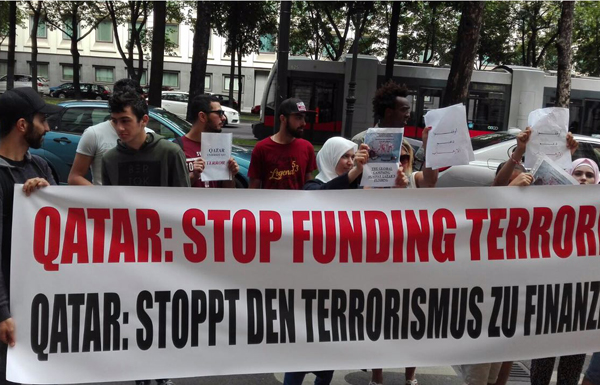By Doaa emam
A Belgian parliamentarian, speaking at a roundtable forum at the European Commission office in Madrid, accused Qatar of allocating millions of dollars to Muslim Brotherhood activities in Europe.
Citing “European financial and security reports,” Koen Metsu, a member of the Belgian parliament and president of the Belgian Temporary Parliamentary Committee for the Fight Against Terrorism, asserted that Qatar has for a decade financially supported the Muslim Brotherhood in France, the United Kingdom, Italy and Denmark, with more than $175 million. Qatar was said to have also provided “ideological support.”
Metsu said any discussion on terrorist financing would not be reasonable if the role of the Qatari funds in supporting Muslim Brotherhood-affiliated organizations was not examined.
“The world has entered a stage of cheap terrorism in which anybody can get hold of a kitchen knife and use it for stupid acts,” he said at the “Financing Terrorist Groups in Europe: Purposes, Results and Future” forum, which was hosted by the European Press Association for the Arab World.
“The problem of financing is no longer limited to these extremist acts but extends to financing extremist ideas and that’s the battle we have to win,” Metsu said.
Participants at the forum reflected a heightened understanding in Europe of the objectives of Islamist groups to control the Muslim communities in Europe and use them for political gain.
They pointed out the need to eradicate terrorist groups in Europe by targeting their financing. Extremist organizations survive on donations from foreign countries and charities and on revenues generated by drug sales and money laundering.
French MP Jacques Myard, a former member of the French National Assembly’s International Affairs Committee, said: “Terrorism started with the emergence of the Muslim Brotherhood in Egypt.”
He said French intelligence services assembled a list of 30,000 names of radicalised individuals who could potentially turn into terrorists.
Myard added: “Europeans ended up having a big problem with the Americans regarding [the Islamic State] using the internet to advertise because the Americans refuse to amend laws so as to make it possible for courts to go after social media companies like Facebook, Twitter, WhatsApp and others if they fail to curb this advertisement.”
Some forum participants contended that the European effort has not focused enough on terrorism financing. European security agencies often focus on side activities, such as drug dealing and money laundering, and ignore the lion’s share of financing Islamist groups, namely big donations from some countries, they argued.
Metsu told The Arab Weekly that Doha was trying “to use Muslim Brotherhood groups in Europe as its own pressure groups to increase its power and influence among the Arab and Muslim communities and also to influence decision-makers in political and academic circles.”
“Security and financial reports in Europe show the Muslim Brotherhood controls many of the Islamic organisations that are supposed to defend Muslim communities,” Metsu noted.
Karim Ifrak, a founding member of the Federation of Muslim Republicans in France, said that in the eyes of French legislation, Islamist financial backers “were not donating money to support terrorists because, in the end, they were supporting Muslim citizens. The Islamists have obviously abused the system.”
“There are certain Gulf and Arab countries (that) have finally realised that, by backing extremist Islamists, they were, in fact, on the wrong path. Qatar is not among these countries. It continues to protect Yusuf al-Qaradawi (head of the International Union of Muslim Scholars) and to send money to the Muslim Brothers,” Ifrak said.
“We are willing to help Qatar come to its senses if it so desires,” he added.
Metsu, citing undisclosed European statistical data, said: “Qatar Charity is one of the main supporters of Islamic groups in Europe, donating money to 60% of Islamic institutions, including charities, relief programmes, Quranic schools and mosques.”
Mohamed Ahsissene, secretary-general of the Communication Commission of the Socialists Party of Catalonia, pointed out that “many European governments refuse to finance mosques and are tough about authorising them and this creates a crack through which foreign powers can present themselves as patrons of mosques in Europe.”
Ahsissene said such a situation presents an opportunity for Islamist groups to launch long-term “blackmailing operations.”
“These groups get funds for a specific goal, which is usually to finish building a mosque, but the construction may take 20 years to finish,” he said.
Islamist agendas have often been suspected of being a factor in preventing many Muslims from blending in European societies and while Islamists have always blamed European governments for not helping Muslims assimilate, Ahsissene challenged Muslims to stop complaining. “The doors are open to Muslims to become part of the society,” he said.







































admin in: How the Muslim Brotherhood betrayed Saudi Arabia?
Great article with insight ...
https://www.viagrapascherfr.com/achat-sildenafil-pfizer-tarif/ in: Cross-region cooperation between anti-terrorism agencies needed
Hello there, just became aware of your blog through Google, and found ...